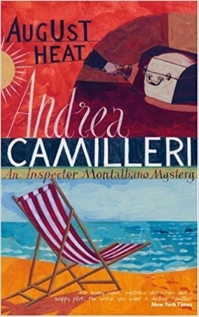|
There's plenty of
incidental information here about how business goes down in the old clan driven
society of Sicily and the nepotism and corruption that's endemic and difficult
to navigate for any policeman trying to follow a credible sense of justice. As
usual, Camilleri uses Montalbano to sound off about Italian politics,
literature and writing.
'(Montalbano) sat
outside until eleven o'clock, reading a good detective novel by two Swedish
authors, husband and wife, in which there wasn't a page without a ferocious and
justified attack on social democracy and the government. In his mind Montalbano
dedicated the book to all those who did not deign to read mystery novels
because, in their opinion, they were only entertaining puzzles.' (p.
116)
Not so long ago this
sort of veiled advertising would've been dismissed as "authorial intrusion", a
form of propaganda that steps outside the aesthetic goal of the objective
narrative, i.e. just keep out of it, stick to the story on hand, sir. But of
course it can be argued that Montalbano's opinions are essential to the
understanding of his character, so... so what if he has opinions on writing?
He's literate, isn't he, reads books, isn't necessarily a shill for the author.
No? How about
Montalbano's thoughts after his telephone conversation with Dr. Arqua: "Nice
exchange. Terse and crisp as a dialogue from one of Vittorio Alfieri's
tragedies." Well, whatever you think of this, it's undeniably clever and shows
that Camilleri knows damn well that's he's a good writer in full control of his
chops, like a jazz musician who can move modally through the scales without
losing the theme.
As usual, there are
some interesting lines:
'Having a Ferrari
in a small town was like keeping a lion in your apartment's bathroom' (re
Spitaleri, the developer, p.72)
or:
' Italy was still
servile, obeying at least two masters, America and the Church'
(p.113)
For anyone who has
read Camilleri's novella, The Fourth Secret, some of the action will seem
deja vu, as if it's been welded into August Heat as a back story.
Montalbano and his Sergeant visit a construction site, use force to extract
some information from the night watchman (has a criminal record) who assumes
they are mafiosi. While this off-the-books vigilante action is distasteful to
Montalbano, it nevertheless thrills the reader who can appreciate that on this
occasion that mutatis mutandis can be achieved.
Perhaps the main
reason why Camilleri's Montalbano novels succeed is because they deliver a
clear sense of morality. In the vast majority of contemporary mystery writings,
morality is incidental to the 'puzzle'.
It might be the heat.
The narrative becomes giddy in places, the action delirious. Montalbano returns
to his house late on the August 15 holiday, finds his veranda has been occupied
and trashed by some young day-trippers. Insults are exchanged and Montalbano
punches out one of the punks. His frustration is historic, like a car engine
running wild after too many klicks. He's lost control of the case, like a
director losing control of his diva. Adriana is never quite real, is more like
a menae, a mythological goddess sent to torment the detective as he leaves the
summer, enters the cooling season. Once again, the story is a test: does
Montalbano succeed or fail... or fall into the flaming ambiguity of middle
age?
Uneven, with some
flashes of genius and a good measure of self-loathing, August Heat is bound to
annoy many Montalbano fans who expect him to be perfect forever.
© LR April
2017
*Check out LR's
OUTLAW
ACADEMIC »»
or LR's novel
RADIO
BRAZIL »»
|
